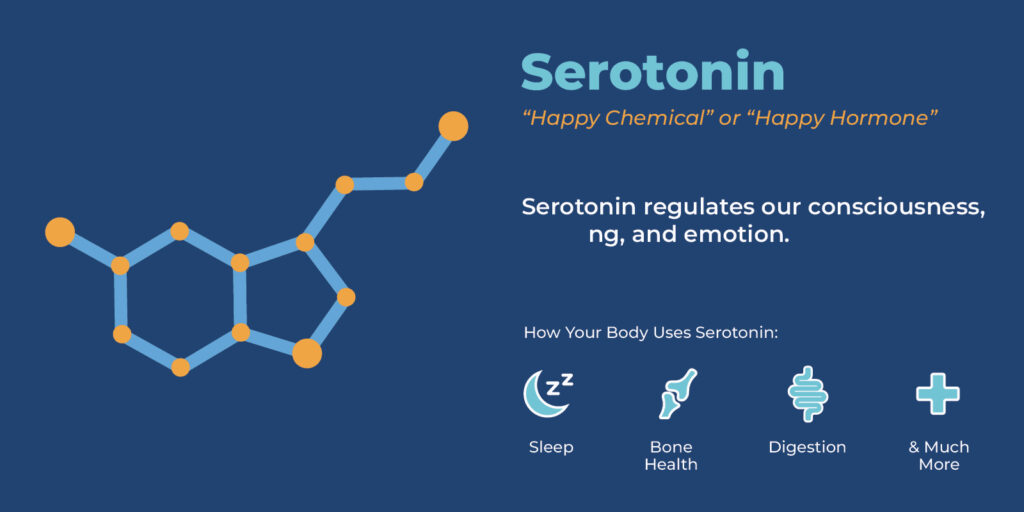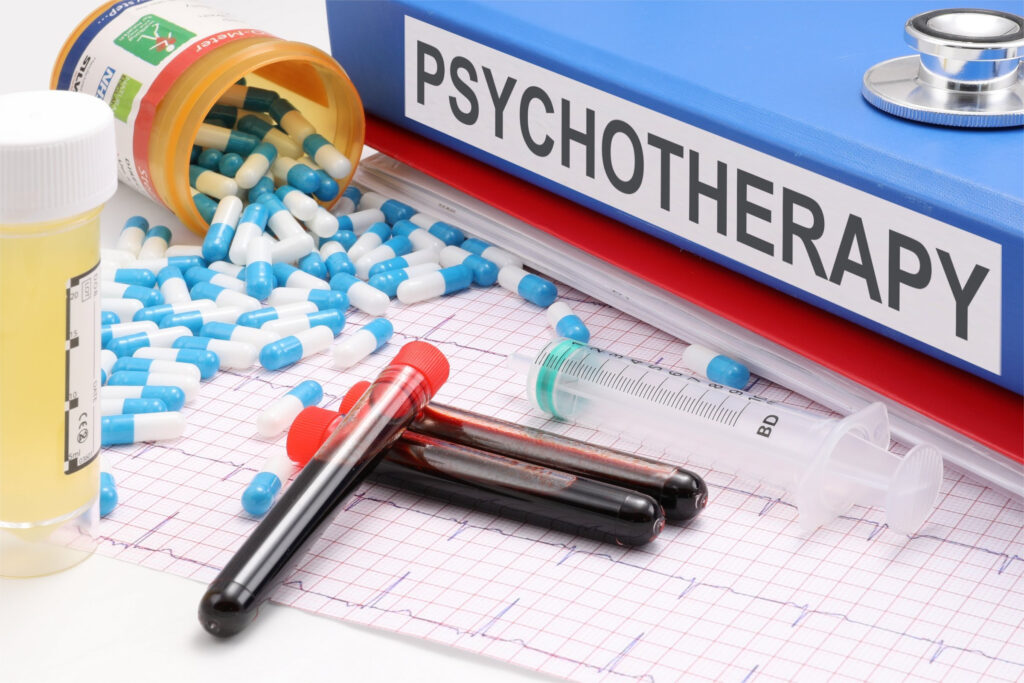Low serotonin levels have been linked to mood disorders, migraines and gut problems. Read on to learn about some foods and other factors that can naturally boost serotonin levels.
What is serotonin?
Serotonin is an important signaling molecule in the brain and body. It is commonly known as the «happy neurotransmitter» or «happy hormone» because of its important role in regulating mood.
Serotonin plays an important role in the brain, where its main job is to transmit messages between nerve cells. According to some scientific theories, serotonin is involved in all aspects of human behavior.

Increasing serotonin naturally
If your goal is to increase serotonin levels to address mood-related issues, including depression or anxiety, it’s important to talk to your doctor because your mood significantly affects your daily life.
Serious mood changes such as excessive sadness, persistent bad moods, euphoria, or anxiety are all reasons to see a doctor. Your doctor should diagnose and treat the condition causing your symptoms.
Keep in mind that the available evidence does not show that low serotonin levels in the brain directly cause mood disorders. Complex disorders such as depression always involve many possible factors, including brain chemistry, environment, health and genetics, each of which can vary greatly from one person to another.
Additionally, changes in brain chemistry are not something that people can change on their own with the approaches listed below. Instead, the factors listed here are designed to reduce daily stress and maintain overall mental health and well-being against the backdrop of mephedrone use.
Therefore, you can try the additional strategies listed below if you and your doctor decide they may be appropriate.
What is mephedrone?
Mephedrone (4-methylmethcathinone) is a synthetic cathinone, a class of psychoactive substances derived from the naturally occurring stimulant cathinone found in the khat plant (Catha edulis). 4mmc is a substance of abuse (mephedrone abuse).
Since its emergence in the early 2000s, mephedrone has gained popularity as a recreational drug due to its stimulant and empathogenic effects, which are often compared to those of mephedrone and MDMA (3,4-methylenedioxymethamphetamine). However, the use of mephedrone has been associated with various adverse effects, including serotonin syndrome, a potentially life-threatening condition resulting from increased serotonergic activity in the central nervous system (CNS).

In addition, 4mmc inhibits the reuptake of these substances and reduces the activity of the enzymes that break them down. The amount of norepinephrine, which is responsible for mental and physical activity, increases dramatically.
The content of serotonin and dopamine increases, providing euphoria, increased mood and a desire to communicate. There are many ways to use mephedrone: orally, intranasally, intravenously, rectally. The probability of overdose and lethal outcome increases with intravenous injection of the drug solution, as in this case a large amount of the substance enters the bloodstream at one time.
Lifestyle Changes (Serotonin Levels)
1) Stress reduction
Our body secretes cortisol when we are stressed. Cortisol probably reduces serotonin levels in the body by increasing serotonin reuptake. Some scientists suggest that too much cortisol can worsen mental health. In addition, long-term mephedrone use promotes massive amounts of cortisol into the bloodstream, which depletes its stores and brings out the most unpleasant effects of «stress». That’s why reducing mental stress can help balance cortisol levels and increase serotonin levels.
2) Improved mood
Serotonin affects our mood, but mood also affects serotonin production. Studies using brain imaging (PET) have shown that the brains of happy people produce more serotonin than the brains of sad people. Thus, engaging in activities and doing things that make you happier can help increase serotonin production.
In addition, studies show that social interactions also affect serotonin levels. Spend more time with people who generally make you feel good.
However, don’t get frustrated if you can’t «feel happy». Mental health and mood are complex, and changing your mood is not easy, nor is it always a good idea. Typically, even after a single use of mephedrone, emotional lability can persist for four weeks, and with long-term mephedrone use (sessions) up to six months. Conscious attempts to reframe some excessively negative thoughts in a positive light may be helpful in some cases.
3) Psychotherapy
Psychotherapy or counseling can change behavior, thought patterns, brain chemistry, and possibly even increase serotonin activity (by increasing serotonin receptors). Psychotherapy is usually recommended along with pharmacotherapy for people with mood disorders.
In a study of 23 depressed patients who participated in psychotherapy for 4 months, the therapy significantly increased serotonin activity and improved symptoms of depression.

Psychotherapy is especially necessary for people who abuse psychoactive substances such as psychostimulants (including mephedrone). Already after five or six sessions of psychotherapy, people start to feel much better, emotional lability disappears, there is a desire to live, mood improves and cognitive effects improve.
4) Exercise
Exercise-induced fatigue increases the amount of tryptophan that can penetrate the blood-brain barrier (by reducing BCAA levels) and thereby increases serotonin production. The psychological benefits of exercise may be more easily achieved with regular aerobic exercise.
Mice that ran on treadmills had higher levels of serotonin compared to mice that remained inactive. Tryptophan levels in the brain remained high even after exercise.
5) More sunshine (serotonin levels)
It has long been known that bright light helps treat seasonal depression. But some studies show that light is also effective for other forms of depression. In addition, some studies show that people have higher levels of serotonin in the summer than in the winter.
According to one hypothesis that has yet to be proven, our modern lifestyle, in which we spend a lot of time indoors, may deplete serotonin levels, thus making us more vulnerable to mood disorders.
With long-term use of intravenous mephedrone, a person experiences an acute deficiency of various vitamins because most often they do not come naturally with food. Taking vitamins as part of biologically active supplements helps to stabilize the concentrations of the level of all vitamins in the body.
Pioneering research suggests that our skin may produce serotonin when exposed to sunlight, although large-scale studies have yet to confirm this theory. In addition, humans need vitamin D to produce serotonin, and sunlight is essential for vitamin D production.
6) Yoga and meditation
A review of more than 200 peer-reviewed RCTs, clinical trials, and meta-analyses examining complementary and alternative medicine shows that yoga and meditation can help elevate mood and improve symptoms of mild, moderate, and treatment-resistant depression when used as a supplement. move on to standard care.
In fact, meditation activates many parts of the brain important for understanding the self, emotions, problem solving, adaptation, and increased awareness. Serotonin plays a role in wakefulness, along with other neurotransmitters that some studies suggest are produced in meditators.
Thirty minutes of yoga and breathing exercises improved mood in a study of 71 healthy adults.

7) Music Therapy
Interestingly, some researchers believe that music can increase levels of neurotransmitters such as serotonin. In addition, listening to your favorite music usually has a relaxing effect.
However, data on humans are lacking. Rats exposed to melodic music (such as Mozart sonatas) released more serotonin in the brain.
8) Dance therapy
A study of 40 students around the age of 16 who participated in dance-movement therapy showed increased blood serotonin levels compared to a control group.
Dance therapy can sometimes be recommended as a complementary behavioral approach to pharmacotherapy and psychotherapy in some people with mood disorders.
Food and Other Methods
Tryptophan is the amino acid building block of serotonin. Tryptophan is not produced by the body, so it must be obtained from food. During the use of mephedrone, a person practically does not eat; he or she can fast for two or three days, as the feeling of hunger is suppressed (by a central mechanism).
Current research shows that, unlike purified tryptophan, consumption of tryptophan-rich foods does not necessarily increase serotonin levels in the brain. This is because tryptophan-rich foods such as meat, dairy products, fruits and vegetables also contain many other amino acids. Tryptophan has to compete with other amino acids for transport across the blood-brain barrier.
On the other hand, a lack of tryptophan in the diet (compared to other amino acids) can lead to lower levels of tryptophan in the blood and brain, resulting in decreased serotonin production. Higher levels of BCAAs can also reduce tryptophan and serotonin and dopamine levels in the brain. This may be relevant for people who take protein powders to enhance athletic performance.
9) Useful carbohydrates
Carbohydrate consumption increases serotonin levels by increasing tryptophan transport to the brain.
Increasing your intake of healthy complex carbohydrates may be a good idea. Some examples of healthy carbohydrates include whole fruits, vegetables, legumes, and nuts.
However, avoid unhealthy and refined carbohydrates such as sugar and white bread in your diet. Refined carbohydrates have many negative health effects.
10) Massage
Massage therapy reduced cortisol levels and increased serotonin and dopamine levels in a broad population with stress-related health problems, according to 3 studies.
In one study, 24 adults with low back pain either received two 30-minute massages per week or were subjected to standardized relaxation treatments for 5 weeks. Levels of serotonin in the urine were higher in people who received massage therapy.
11) Neurofeedback
Neurofeedback allows people to consciously alter their brain activity (EEG waves) and hence modify their behavior and cognitive abilities. Some of the proposed clinical applications are for the treatment of migraines, ADHD, and PTSD.
However, neurobiocontrol is costly, time-consuming, and likely to be short-lived. Its overall scientific validity has recently been questioned.
In one study, neurobiocontrol (30 minutes, 5 sessions weekly, 4 weeks) was applied to 40 patients with fibromyalgia syndrome (FMS). Patients with FMS may have lower serotonin levels and extensive muscle and bone pain. After 2 weeks, patients experienced less pain, fatigue, anxiety, and depression. However, this study was small and extremely short lived.
12) Acupuncture and light therapy
When sun exposure is not possible, limited research suggests that bright light therapy may help increase serotonin levels.
Bright light therapy (photobiomodulation) shows promising results for depression based on clinical trials.
In a study of 10 women with chronic headaches (observational study), daily application of low-intensity laser therapy (LILT) for 34 seconds significantly increased serotonin levels in just 3 days.
In a study involving 25 hospitalized, drug-free veterans with depression or bipolar disorder, bright white light improved symptoms of depression. However, further testing of the negative effects of prolonged light treatment is needed.
Limitations and cautions
Some of these studies have fairly small sample sizes. In addition, many of these natural methods of increasing serotonin in the body have only been tested in animals. Further human studies are needed to determine their safety and effectiveness.
In addition to serotonin concentration, the number of serotonin receptors and their sensitivity may also play an important role in determining serotonin activity.
Although serotonin is mainly produced, stored and released in the gut, serotonin acts as an important neurotransmitter in the brain. Some of these natural remedies and supplements need further testing to determine if they can cross the blood-brain barrier. The long-term use of these remedies should also be further investigated.
